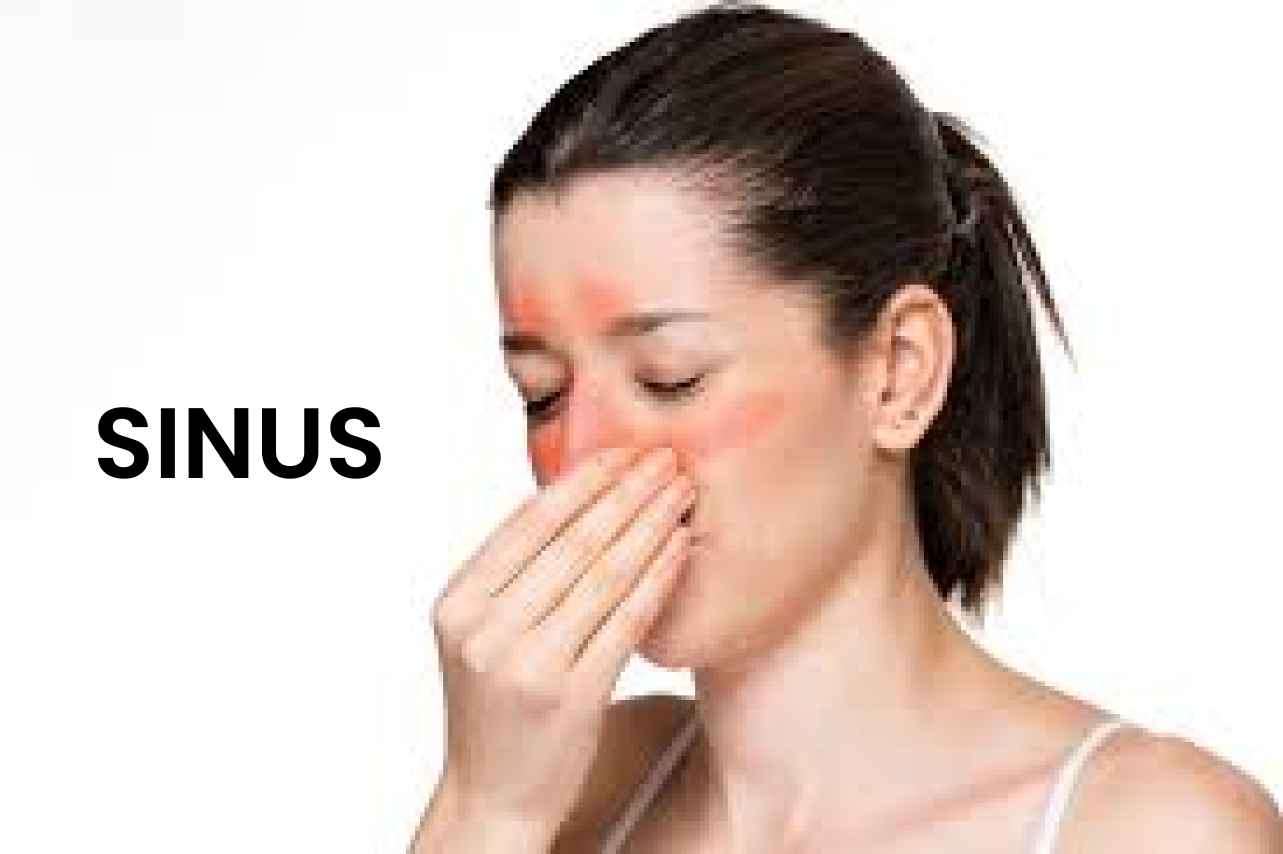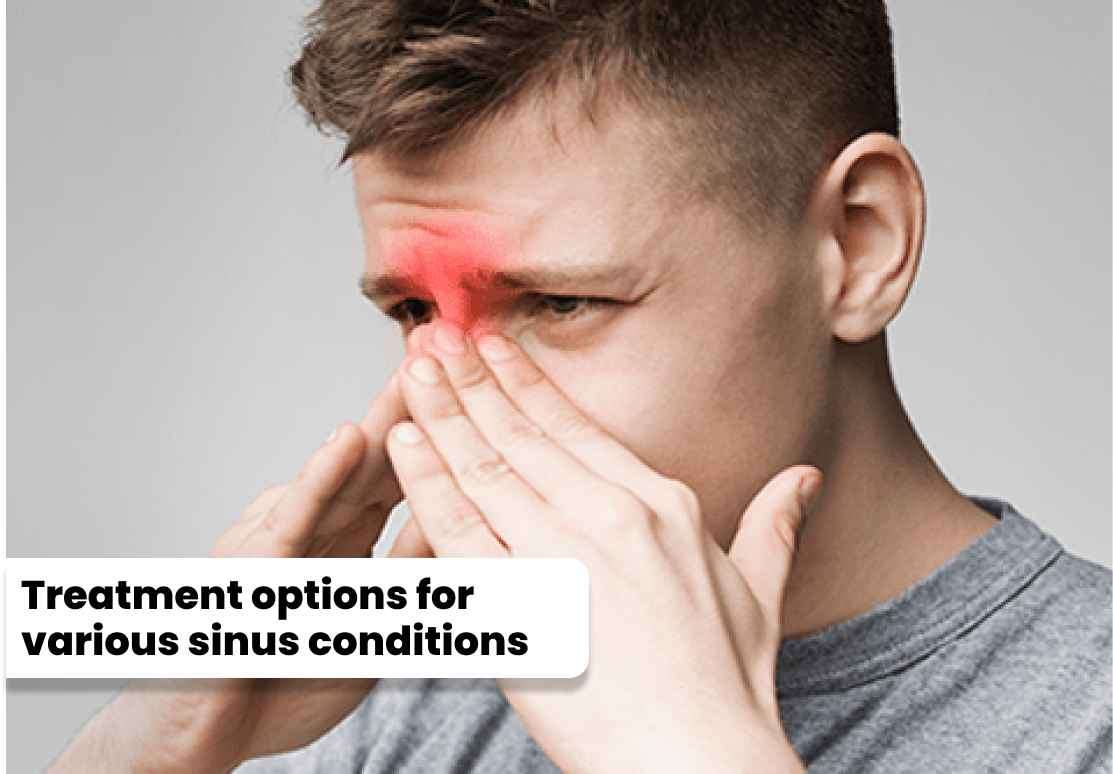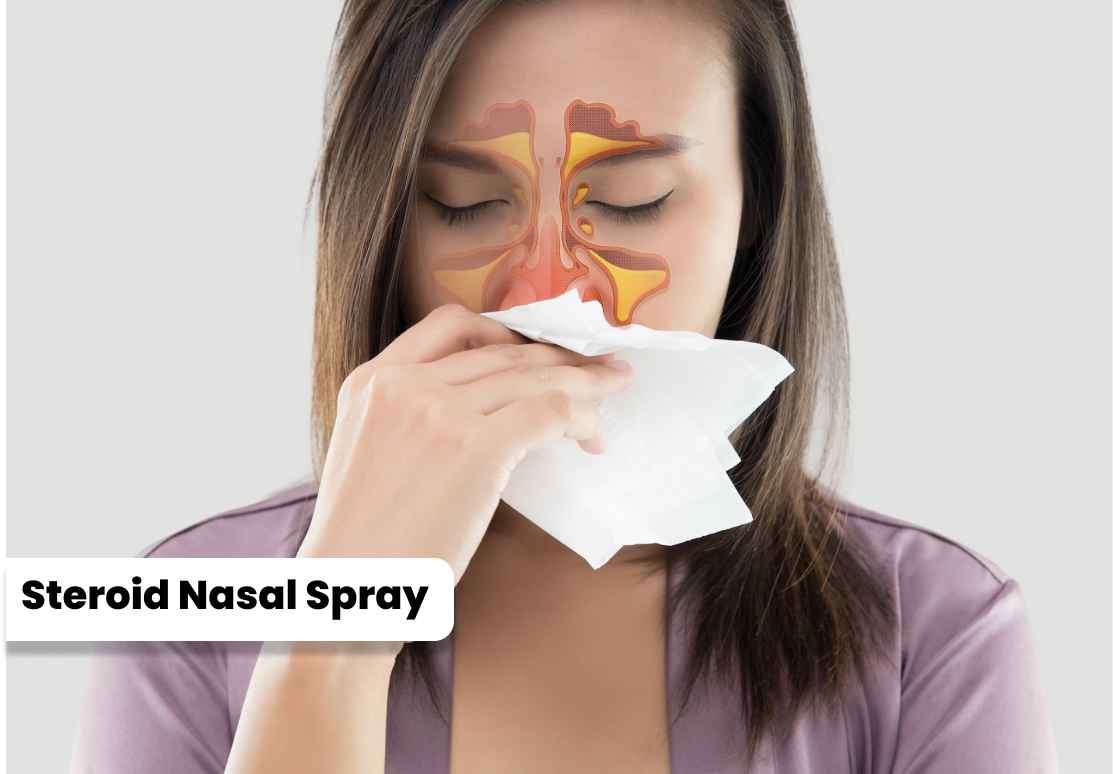Sinus treatment aims to alleviate the symptoms and address the underlying causes of sinus conditions.
Call us to book an appointment with the best Otolaryngologist-Ear,
Nose, and Throat (ENT) specialist or a Sinus Surgeon near you.
Sinus conditions, such as sinus infections, postnasal drip, and chronic sinusitis, can cause discomfort and affect daily life. Thankfully, various treatment options are available to address these issues and provide relief. From over-the-counter medications to home remedies and prescription treatments, there are several approaches to managing sinus-related symptoms.

Sinus conditions, such as sinus infections, postnasal drip, and chronic sinusitis, can cause discomfort and affect daily life. Thankfully, various treatment options are available to address these issues and provide relief. From over-the-counter medications to home remedies and prescription treatments, there are several approaches to managing sinus-related symptoms.
Sinus Infection Treatment:
Sinus infections, also known as sinusitis, can be acute or chronic. Mild cases may resolve on their own, but severe or persistent infections may require treatment. Typical treatment options include: Sinus Medicine: When a bacterial infection is present, a healthcare professional may prescribe antibiotics to eliminate the infection. Decongestants: Over-the-counter oral or nasal decongestants can help relieve sinus congestion and facilitate drainage. Saline Nasal Irrigation: Rinsing the nasal passages with a saline solution can help remove excess mucus and reduce inflammation. Post Nasal Drip Treatment:
Postnasal drip occurs when excess mucus drips down the back of the throat, causing coughing, throat irritation, and congestion. Treatment options include: Nasal Irrigation: Regular saline nasal irrigation can help flush out mucus and irritants from the nasal passages. Over-the-Counter Medications: Antihistamines and decongestants can help reduce mucus production and alleviate symptoms. Hydration: Drinking plenty of fluids helps thin the mucus, making it easier to expel. Nasal Polyps Treatment:
Nasal polyps are noncancerous growths that can develop in the lining of the nasal passages. Treatment options include: Medications: Corticosteroid nasal sprays or oral corticosteroids can help shrink nasal polyps and reduce inflammation. Surgical Removal: In some cases, when nasal polyps are large or don't respond to medication, surgical removal may be necessary. Chronic Sinusitis Treatment:
Chronic sinusitis refers to long-lasting inflammation of the sinuses. Treatment options include: Nasal Steroid Sprays: Corticosteroid nasal sprays help reduce inflammation and control symptoms. Antibiotics: In some cases, antibiotics may be prescribed to treat underlying bacterial infections. Sinus Surgery: Functional endoscopic sinus surgery (FESS) is performed to improve sinus drainage and remove blockages. Deviated Nasal Septum Treatment:
A deviated nasal septum occurs when the thin wall separating the nasal passages is crooked or off-center. Treatment options include: Nasal Decongestants: Over-the-counter nasal decongestant sprays can help reduce congestion caused by a deviated septum. Surgical Correction: If the deviated septum causes severe symptoms, surgery may be recommended to correct the alignment.

Sinus Infection Treatment:
Sinus infections, also known as sinusitis, can be acute or chronic. Mild cases may resolve on their own, but severe or persistent infections may require treatment. Typical treatment options include:
Sinus Medicine: When a bacterial infection is present, a healthcare professional may prescribe antibiotics to eliminate the infection.
Decongestants: Over-the-counter oral or nasal decongestants can help relieve sinus congestion and facilitate drainage.
Saline Nasal Irrigation: Rinsing the nasal passages with a saline solution can help remove excess mucus and reduce inflammation.
Post Nasal Drip Treatment:
Postnasal drip occurs when excess mucus drips down the back of the throat, causing coughing, throat irritation, and congestion. Treatment options include:
Nasal Irrigation: Regular saline nasal irrigation can help flush out mucus and irritants from the nasal passages.
Over-the-Counter Medications: Antihistamines and decongestants can help reduce mucus production and alleviate symptoms.
Hydration: Drinking plenty of fluids helps thin the mucus, making it easier to expel.
Nasal Polyps Treatment:
Nasal polyps are noncancerous growths that can develop in the lining of the nasal passages. Treatment options include:
Medications: Corticosteroid nasal sprays or oral corticosteroids can help shrink nasal polyps and reduce inflammation.
Surgical Removal: In some cases, when nasal polyps are large or don't respond to medication, surgical removal may be necessary.
Chronic Sinusitis Treatment:
Chronic sinusitis refers to long-lasting inflammation of the sinuses. Treatment options include:
Nasal Steroid Sprays: Corticosteroid nasal sprays help reduce inflammation and control symptoms.
Antibiotics: In some cases, antibiotics may be prescribed to treat underlying bacterial infections.
Sinus Surgery: Functional endoscopic sinus surgery (FESS) is performed to improve sinus drainage and remove blockages.
Deviated Nasal Septum Treatment:
A deviated nasal septum occurs when the thin wall separating the nasal passages is crooked or off-center. Treatment options include:
Nasal Decongestants: Over-the-counter nasal decongestant sprays can help reduce congestion caused by a deviated septum.
Surgical Correction: If the deviated septum causes severe symptoms, surgery may be recommended to correct the alignment.
1. Hydration:
Staying well-hydrated is essential for thinning mucus and promoting sinus drainage. Drink plenty of fluids, such as water, herbal teas, and clear broths, throughout the day. Avoid excessive caffeine and alcohol, as they can dehydrate the body.
2. Warm Compresses:
Applying warm compresses to the affected areas can help relieve sinus headache pain. Soak a clean washcloth in warm water, wring out the excess, and place it over your forehead, eyes, and cheeks for 10-15 minutes. Repeat this several times a day as needed.
3. Steam Inhalation:
Inhaling steam can help moisten and clear the nasal passages, providing relief from sinus congestion and pain. Boil water, pour it into a bowl, and place your face over the bowl, covering your head with a towel to trap the steam. Breathe deeply for 5-10 minutes. You can also add a few drops of essential oils like eucalyptus or peppermint for added soothing benefits. 4. Saline Nasal Irrigation:
Saline nasal irrigation is an effective method to rinse the nasal passages and reduce congestion. You can use a neti pot or a squeeze bottle specifically designed for nasal irrigation. Mix a saline solution using distilled or sterile water and salt, following the instructions provided. Tilt your head to the side and gently pour the solution into one nostril, allowing it to flow out of the other nostril. Repeat on the other side.
5. Humidification:
Dry air can irritate the nasal passages and worsen sinus headaches. Use a humidifier or vaporizer to add moisture to the air in your home, especially in your bedroom while sleeping. Clean the humidifier regularly to prevent the growth of bacteria or mold. 6. Rest and Relaxation:
Allowing your body to rest and recover is crucial when dealing with a sinus headache. Take breaks, practice relaxation techniques like deep breathing or meditation, and ensure you get sufficient sleep to support your body's healing process. 7. Avoid Triggers:
Identify and avoid potential triggers that can worsen sinus headaches. These triggers may vary from person to person but can include allergens like pollen, dust, or certain strong odors. Minimize exposure to these triggers to help prevent or reduce the frequency of sinus headaches. 8. Over-the-Counter Remedies:
Some over-the-counter medications can provide temporary relief from sinus headache symptoms. Pain relievers such as ibuprofen or acetaminophen can help alleviate pain and reduce inflammation. However, it is important to follow the recommended dosage and consult a healthcare professional if you have any underlying medical conditions or are taking other medications.

1. Hydration:
Staying well-hydrated is essential for thinning mucus and promoting sinus drainage. Drink plenty of fluids, such as water, herbal teas, and clear broths, throughout the day. Avoid excessive caffeine and alcohol, as they can dehydrate the body.
2. Warm Compresses:
Applying warm compresses to the affected areas can help relieve sinus headache pain. Soak a clean washcloth in warm water, wring out the excess, and place it over your forehead, eyes, and cheeks for 10-15 minutes. Repeat this several times a day as needed.
3. Steam Inhalation: Inhaling steam can help moisten and clear the nasal passages, providing relief from sinus congestion and pain. Boil water, pour it into a bowl, and place your face over the bowl, covering your head with a towel to trap the steam. Breathe deeply for 5-10 minutes. You can also add a few drops of essential oils like eucalyptus or peppermint for added soothing benefits.
4. Saline Nasal Irrigation:
Saline nasal irrigation is an effective method to rinse the nasal passages and reduce congestion. You can use a neti pot or a squeeze bottle specifically designed for nasal irrigation. Mix a saline solution using distilled or sterile water and salt, following the instructions provided. Tilt your head to the side and gently pour the solution into one nostril, allowing it to flow out of the other nostril. Repeat on the other side.
5. Humidification: Dry air can irritate the nasal passages and worsen sinus headaches. Use a humidifier or vaporizer to add moisture to the air in your home, especially in your bedroom while sleeping. Clean the humidifier regularly to prevent the growth of bacteria or mold.
6. Rest and Relaxation: Allowing your body to rest and recover is crucial when dealing with a sinus headache. Take breaks, practice relaxation techniques like deep breathing or meditation, and ensure you get sufficient sleep to support your body's healing process.
7. Avoid Triggers: Identify and avoid potential triggers that can worsen sinus headaches. These triggers may vary from person to person but can include allergens like pollen, dust, or certain strong odors. Minimize exposure to these triggers to help prevent or reduce the frequency of sinus headaches.
8. Over-the-Counter Remedies:
Some over-the-counter medications can provide temporary relief from sinus headache symptoms. Pain relievers such as ibuprofen or acetaminophen can help alleviate pain and reduce inflammation. However, it is important to follow the recommended dosage and consult a healthcare professional if you have any underlying medical conditions or are taking other medications.
Steroid nasal sprays are a popular and effective treatment option for nasal inflammation caused by allergies, sinusitis, or other nasal conditions. These sprays contain corticosteroids, which work by reducing inflammation and swelling in the nasal passages. How Steroid Nasal Sprays Work:
Steroid nasal sprays deliver a small amount of corticosteroid medication directly to the nasal passages. The active ingredient in these sprays helps reduce inflammation and swelling by inhibiting the release of inflammatory substances. By targeting the source of the problem, steroid nasal sprays provide relief from symptoms such as nasal congestion, sneezing, itching, and a runny nose. Benefits of Steroid Nasal Sprays:
Steroid nasal sprays offer several benefits for individuals with nasal inflammation or allergies, including: 1. Reduced Inflammation: Corticosteroids in nasal sprays effectively reduce inflammation in the nasal passages, providing relief from symptoms and promoting easier breathing. 2. Allergy Symptom Relief: Nasal allergies, such as hay fever or allergic rhinitis, can cause bothersome symptoms. Steroid nasal sprays can alleviate nasal congestion, itching, sneezing, and a runny nose associated with allergic reactions.
3. Localized Treatment: Unlike oral medications, which affect the entire body, steroid nasal sprays work directly in the nasal passages, minimizing systemic side effects.
3. Localized Treatment: Unlike oral medications, which affect the entire body, steroid nasal sprays work directly in the nasal passages, minimizing systemic side effects.
Proper Usage of Steroid Nasal Sprays:
To maximize the benefits of steroid nasal sprays, it is important to follow these guidelines: 1. Preparation: Before using the nasal spray, gently blow your nose to clear any mucus. Shake the spray bottle well to ensure proper mixing of the medication. 2. Administration: Insert the nozzle into one nostril and close the other nostril by pressing a finger against it. Aim the spray nozzle away from the center of the nose, towards the outer wall. Breathe in gently through your nose while simultaneously pressing down on the spray pump. Repeat these steps for the other nostril if instructed to do so.
3. Technique: It is essential to use the nasal spray correctly to ensure proper delivery of the medication. Avoid sniffing or inhaling forcefully after spraying to prevent the medication from entering the throat.
4. Consistency: For optimal results, use the steroid nasal spray regularly as prescribed by your healthcare professional, even if you are not experiencing symptoms. Potential Side Effects and Precautions:
While steroid nasal sprays are generally safe and well-tolerated, some individuals may experience mild side effects, such as:
- Nasal irritation or stinging Dryness or itching in the nose Sneezing or a temporary increase in nasal congestion To minimize the risk of side effects, it is recommended to:
Follow the prescribed dosage and frequency. Avoid exceeding the recommended duration of use. Rinse your mouth with water after using the nasal spray to prevent the possibility of oral fungal infections.

Steroid nasal sprays are a popular and effective treatment option for nasal inflammation caused by allergies, sinusitis, or other nasal conditions. These sprays contain corticosteroids, which work by reducing inflammation and swelling in the nasal passages.
How Steroid Nasal Sprays Work:
Steroid nasal sprays deliver a small amount of corticosteroid medication directly to the nasal passages. The active ingredient in these sprays helps reduce inflammation and swelling by inhibiting the release of inflammatory substances. By targeting the source of the problem, steroid nasal sprays provide relief from symptoms such as nasal congestion, sneezing, itching, and a runny nose.
Benefits of Steroid Nasal Sprays: Steroid nasal sprays offer several benefits for individuals with nasal inflammation or allergies, including:
1. Reduced Inflammation: Corticosteroids in nasal sprays effectively reduce inflammation in the nasal passages, providing relief from symptoms and promoting easier breathing.
2. Allergy Symptom Relief: Nasal allergies, such as hay fever or allergic rhinitis, can cause bothersome symptoms. Steroid nasal sprays can alleviate nasal congestion, itching, sneezing, and a runny nose associated with allergic reactions.
3. Localized Treatment: Unlike oral medications, which affect the entire body, steroid nasal sprays work directly in the nasal passages, minimizing systemic side effects.
3. Localized Treatment: Unlike oral medications, which affect the entire body, steroid nasal sprays work directly in the nasal passages, minimizing systemic side effects.
Proper Usage of Steroid Nasal Sprays: To maximize the benefits of steroid nasal sprays, it is important to follow these guidelines:
1. Preparation: Before using the nasal spray, gently blow your nose to clear any mucus. Shake the spray bottle well to ensure proper mixing of the medication.
2. Administration: Insert the nozzle into one nostril and close the other nostril by pressing a finger against it. Aim the spray nozzle away from the center of the nose, towards the outer wall. Breathe in gently through your nose while simultaneously pressing down on the spray pump. Repeat these steps for the other nostril if instructed to do so.
3. Technique: It is essential to use the nasal spray correctly to ensure proper delivery of the medication. Avoid sniffing or inhaling forcefully after spraying to prevent the medication from entering the throat.
4. Consistency: For optimal results, use the steroid nasal spray regularly as prescribed by your healthcare professional, even if you are not experiencing symptoms.
Potential Side Effects and Precautions:
While steroid nasal sprays are generally safe and well-tolerated, some individuals may experience mild side effects, such as:
-
Nasal irritation or stinging
Dryness or itching in the nose
Sneezing or a temporary increase in nasal congestion
To minimize the risk of side effects, it is recommended to:
Follow the prescribed dosage and frequency.
Avoid exceeding the recommended duration of use.
Rinse your mouth with water after using the nasal spray to prevent the possibility of oral fungal infections.
|
Serial No |
City |
Minimum Cost (INR) |
Average Cost (INR) |
|
1 |
Mumbai |
5,000 |
25,000 |
|
2 |
Delhi |
4,000 |
20,000 |
|
3 |
Bangalore |
3,500 |
18,000 |
|
4 |
Chennai |
3,000 |
15,000 |
|
5 |
Kolkata |
3,000 |
15,000 |
|
6 |
Hyderabad |
2,500 |
12,000 |
|
7 |
Pune |
2,500 |
12,000 |
|
8 |
Ahmedabad |
2,000 |
10,000 |
|
9 |
Jaipur |
2,000 |
10,000 |
|
10 |
Chandigarh |
1,800 |
9,000 |
|
11 |
Lucknow |
1,800 |
9,000 |
|
12 |
Indore |
1,500 |
8,000 |
|
13 |
Kochi |
1,500 |
8,000 |
|
14 |
Coimbatore |
1,200 |
6,000 |
|
15 |
Bhopal |
1,200 |
6,000 |
|
16 |
Nagpur |
1,000 |
5,000 |
|
17 |
Goa |
1,000 |
5,000 |
|
18 |
Mangalore |
800 |
4,000 |
|
19 |
Trivandrum |
800 |
4,000 |
|
20 |
Guwahati |
600 |
3,000 |
|
Serial No |
Hospital Name |
City |
Contact Number |
|
1 |
All India Institute of Medical Sciences (AIIMS) |
Multiple Cities |
+91-11-26588500 |
|
2 |
Safdarjung Hospital |
Delhi |
+91-11-2673-0000 |
|
3 |
Post Graduate Institute of Medical Education and Research |
Chandigarh |
+91-172-275-6565 |
|
4 |
Government Medical College and Hospital (GMCH) |
Nagpur |
+91-712-270-1646 |
|
5 |
King George's Medical University (KGMU) |
Lucknow |
+91-522-2257450 |
|
6 |
Madras Medical College |
Chennai |
+91-44-2530-5000 |
|
7 |
Calicut Medical College |
Kozhikode |
+91-495-235-0216 |
|
8 |
Institute of Postgraduate Medical Education and Research |
Kolkata |
+91-33-2204-1000 |
|
9 |
SMS Medical College |
Jaipur |
+91-141-251-8121 |
|
10 |
Government General Hospital |
Vijayawada |
+91-866-257-6000 |
Please Wait..